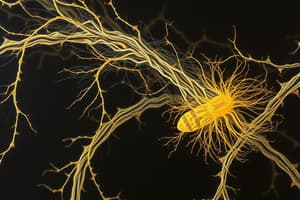Podcast
Questions and Answers
What is one primary function of intermediate filaments?
What is one primary function of intermediate filaments?
- Facilitate the movement of chromosomes
- Transport intracellular vesicles
- Provide structural support and resist internal pressure (correct)
- Site of protein degradation
Which component is involved in the production of microtubules?
Which component is involved in the production of microtubules?
- Keratin
- Neurofilaments
- Proteasomes
- α and β tubulin dimers (correct)
What effect do vincristine and colchicine have on microtubules?
What effect do vincristine and colchicine have on microtubules?
- They prevent the polymerization of tubulin dimers (correct)
- They promote the formation of microtubules
- They enhance chromosome movement
- They stabilize the microtubules
Which cellular structure is primarily the site of protein degradation?
Which cellular structure is primarily the site of protein degradation?
What role do molecular motor proteins play in cellular functions?
What role do molecular motor proteins play in cellular functions?
What is the primary function of lipid rafts in membrane dynamics?
What is the primary function of lipid rafts in membrane dynamics?
Which type of membrane protein is primarily involved in communication between cells?
Which type of membrane protein is primarily involved in communication between cells?
What component is notably present in lipid rafts besides sphingomyelin?
What component is notably present in lipid rafts besides sphingomyelin?
How do lipid rafts influence the properties of the cell membrane?
How do lipid rafts influence the properties of the cell membrane?
Which statement best describes the relationship between membrane proteins and the extracellular matrix?
Which statement best describes the relationship between membrane proteins and the extracellular matrix?
Flashcards are hidden until you start studying
Study Notes
Intermediate Filaments
- Include keratin filaments and neurofilaments for structural support.
- Composed of multiple protein types to resist internal pressure.
- Form flexible scaffolding within the cell and act as linker proteins similar to actin.
Proteasomes
- Function similarly to lysosomes as centers for protein degradation.
Microtubules
- Made of alpha (⍺) and beta (β) tubulin dimers, along with gamma (γ) tubulin for production.
- Play crucial roles in intracellular transport and movement of chromosomes, cilia, and flagella.
- Subject to antitumor drug targeting:
- Vincristine and Colchicine: inhibit tubulin dimer polymerization, preventing microtubule formation.
- Taxol: stabilizes microtubules, leading to cell cycle arrest during mitosis.
Molecular Motor Proteins
- Essential for movement along microtubules, facilitating intracellular transport and cellular motility.
Cell Membrane
- Composed of lipid rafts, aggregations of cholesterol and sphingomyelin associated with specific proteins.
- Functions include segregating signaling molecules and influencing membrane fluidity.
Membrane Proteins
- Integral and intrinsic membrane proteins, which are critical for cell communication and adhesion to other cells and the extracellular matrix.
Membrane Junctions
- Tight or occluding junctions: create barriers to microorganisms and minimize water loss, maintaining homeostasis.
- Gap or communicating junctions (macula communicans): connect neighboring cells via cytoplasmic tunnels (connexons), allowing diffusion of ions and small molecules.
Electrical Synapses
- A subtype of gap junctions facilitating direct electrical and chemical coupling between neurons and specific muscle cells.
Passive Transport
- Involves diffusion, where substances randomly move from areas of higher to lower concentration, driven by innate kinetic energy.
Tonicity and Osmotic Environments
- Identifies states of cells in different solutions (hypertonic, hypotonic, isotonic), emphasizing movement and behavior of cells in various osmotic conditions.
Overview of Insulin Regulation
- Increased blood glucose levels stimulate pancreatic beta cells to release insulin, lowering blood glucose through increased cellular uptake.
- Decreased glucose levels trigger a counter response, balancing the glucose levels through hormone secretion.
Studying That Suits You
Use AI to generate personalized quizzes and flashcards to suit your learning preferences.



